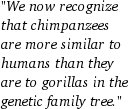The Ethics of Enhancing Animals, Specifically the Great Apes
Guido David Núñez-Mujica
page 2 of 5
Many non-Western cultures also do not possess the revulsion that Westerners tend to have towards animals. In fact, they believe that man and animals - in particular, the primates - are  kin. For example, in the Popul Vuh[1] mythology, when the gods made man, the first try was monkeys. In some African cultures, it is said that we descend directly from chimpanzees.
kin. For example, in the Popul Vuh[1] mythology, when the gods made man, the first try was monkeys. In some African cultures, it is said that we descend directly from chimpanzees.
Our increased awareness of animals has changed our concept of them. We now recognize that chimpanzees are more similar to humans than they are to gorillas in a philogenetic tree. Scientists acknowledge that DNA similarities between humans and chimpanzees are much stronger than those between chimps and gorillas. Previously, humans were classified in the hominidae family and the great apes (including gorillas, chimps, and orangutans) were in a separate family, pongidae. Now, the great apes and humans are all classified in the same group, hominids.
How are Apes Treated Today?
Apes are treated with varying degrees of kindness and/or abuse in the world today. The Great Ape Project wants to grant chimpanzees, gorillas, and orangutans similar rights as humans. These rights would be equivalent to the rights that exist between impaired adults or children and their guardians. The Great Ape Project has achieved a higher level of rights for apes in Western Europe, where experimentation using chimpanzees has been abolished entirely. The Great Ape Project believes that the welfare of the apes must be sought for its own good. Apes, like humans, are ends in themselves.
On the other hand, in the United States, about 1,700 chimpanzees are being held captive in biomedical facilities around the country. These animals are protected by laws, such as the Animal Protection Act, that regulate how these animals are to be treated. We must also note that many apes, especially chimpanzees, are currently used and abused by circuses, movies, or other “entertainment” ventures.
Still, there are advocates for the rights of the apes in the United States. A committee from the National Academy of Sciences (formed by primatologists and people from the biomedical experimentation community) states that euthanasia is not an acceptable way of controlling the chimpanzee population. They contend that even though chimpanzees do not have rights equal to humans, they do have a special status when compared to other laboratory animals (such as rats or dogs) because they are so close to us genetically, possessing consciousness and intelligence.
These positions serve to protect the apes, but they also have a more practical side that ultimately benefits the experimenters. If the apes are subjected to psychological or physical stresses, the experiment results will be skewed because the subject (the ape) will not resemble the organism they are trying to mimic (a relatively healthy human being). Therefore, if they are held in small cages and mistreated, the result will be conditions that disrupt the outcome of the experiments.
Footnote (back to top)
1. The Popol Vuh (Quiché for "Council Book" or "Book of the Community"; Popol Wuj in modern spelling) is the book of scripture of the Quiché, a Kingdom of the Maya civilization in Guatemala. http://en.wikipedia.org/wiki/Popol_Wuj(March 3, 2006 12:00 P.M. EST)
1 2 3 4 5 next page>